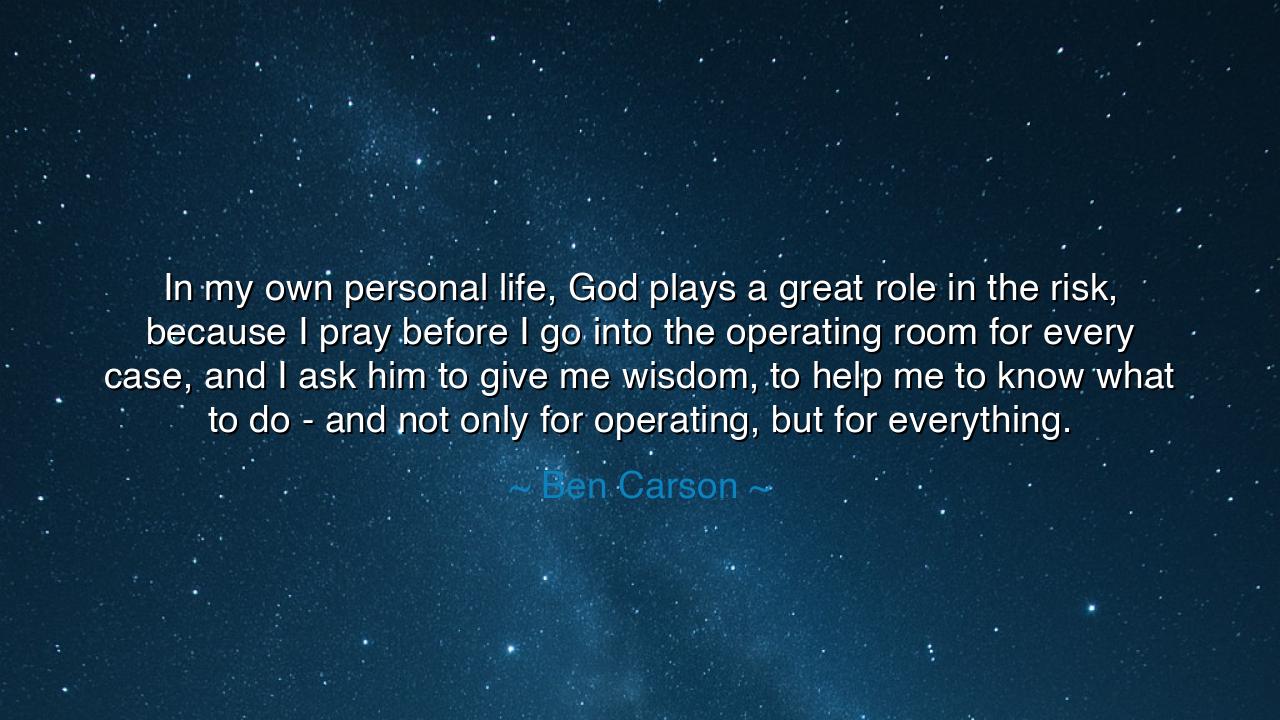
In my own personal life, God plays a great role in the risk
In my own personal life, God plays a great role in the risk, because I pray before I go into the operating room for every case, and I ask him to give me wisdom, to help me to know what to do - and not only for operating, but for everything.






Ben Carson, the healer of bodies and the seeker of divine strength, once proclaimed: “In my own personal life, God plays a great role in the risk, because I pray before I go into the operating room for every case, and I ask Him to give me wisdom, to help me to know what to do—and not only for operating, but for everything.” In these words shines a truth that the ancients knew well: human skill, though great, is never complete without the guidance of the eternal. For wisdom is not born from knowledge alone, but from humility before the Infinite.
Carson speaks of the operating room, where the boundary between life and death is thin as a thread, where human hands tremble with the weight of destiny. In such a place, courage is not found in steel instruments alone, but in faith that the Creator will guide each decision. His prayer is not weakness, but strength—for he admits that man is limited, and in that admission draws upon a power far greater than himself.
The story of Hippocrates, father of medicine, mirrors this truth. Though renowned for his wisdom, he too began his practice with reverence for the divine, offering prayers to Apollo, the healer, before treating the sick. For even the most skilled physician of old knew that the art of medicine is a partnership between man and heaven. In Carson’s words, we hear this same timeless humility: that before touching the body, the soul must first bow to God.
It is also a reminder for all who face risk in their lives, not just the surgeon. Before great endeavors, whether in battle, in governance, or in the struggles of daily life, to seek divine wisdom is to arm oneself with clarity, patience, and strength. Alexander the Great sought omens before his campaigns; Lincoln, before deciding the fate of his nation, was known to fall to his knees in prayer. In such examples we see that prayer has always been the companion of great deeds.
Let the generations remember: to rely on one’s own strength alone is to build a house upon sand, but to combine human effort with faith is to root one’s work in stone. Carson’s words are a testament that prayer is not an escape from responsibility, but an embrace of it, for in seeking wisdom from above, one is better prepared to act with courage below. Thus, the lesson is clear—whether with a scalpel, a sword, or a simple word, the true source of power lies in the union of human will and divine guidance.






TYTanjiro Yoriichi
I find this quote deeply personal and reflective. It shows how faith can shape one’s sense of duty and moral grounding. Yet it also makes me question—what about professionals who don’t share these beliefs? Do they find strength in other sources, like training, ethics, or teamwork? It’s fascinating how different people access courage and wisdom in moments of great risk, whether through spirituality or self-discipline.
GLDang Hoang Giao Linh
Reading this makes me think about the broader idea of humility in leadership and expertise. It’s powerful that someone with immense responsibility admits the need for guidance. Still, I can’t help but ask—how would this mindset be perceived in a secular hospital setting? Can expressions of faith coexist comfortably with modern medicine, or do they sometimes clash with the scientific culture that dominates the field?
HPHoa Phung
There’s something very moving about this acknowledgment of vulnerability from someone in such a high-stakes profession. It reminds me that even the most skilled individuals seek strength beyond themselves. I wonder, though—does this reliance on prayer reflect a belief in divine partnership, or is it a way to center the mind and reduce anxiety? Could spiritual grounding be just as vital as technical expertise in maintaining composure under pressure?
PN26. Phuong Nguyen
I admire the sincerity of this perspective, but it also raises a complex question: should personal faith play a role in professional decision-making, especially in critical environments like surgery? For some, it might offer comfort and confidence, but for others, it could be controversial. Do you think a surgeon’s belief in divine guidance affects patient trust—positively or negatively—depending on the patient’s own worldview?
MPnguyen minh phuong
This quote really highlights the intersection of faith and science in a fascinating way. I find myself wondering—how do medical professionals reconcile their spiritual beliefs with the demands of evidence-based practice? Does relying on prayer before surgery enhance focus and calmness, or could it be seen as introducing subjectivity into a field that depends so much on precision and logic? It’s an interesting blend of humility and responsibility.